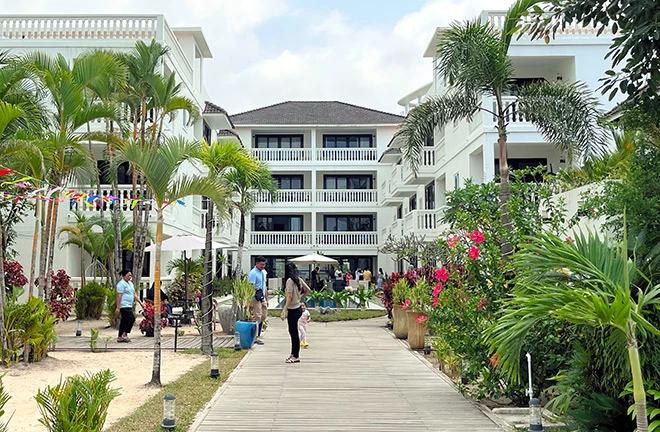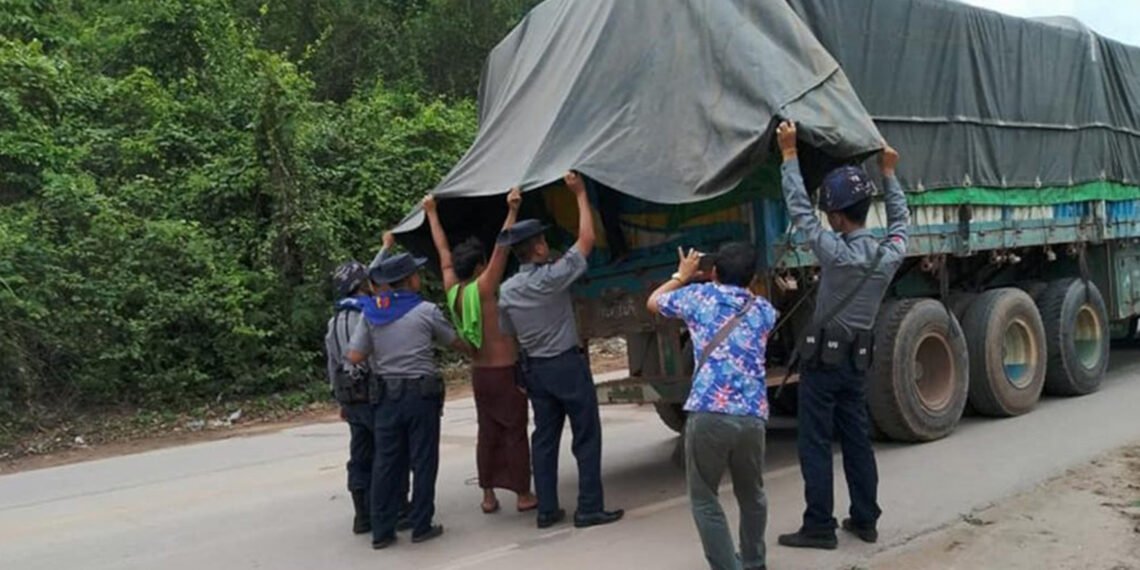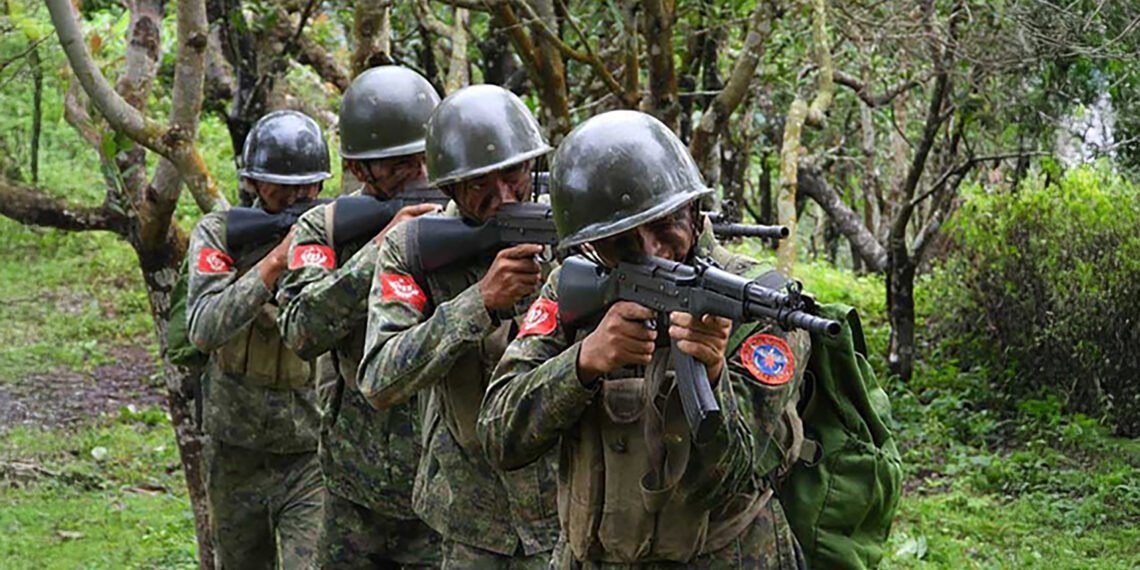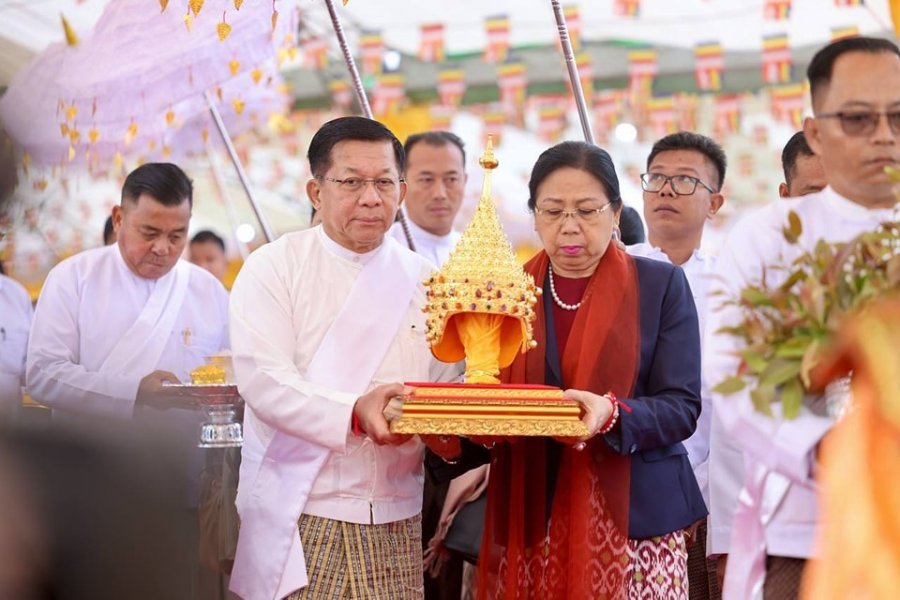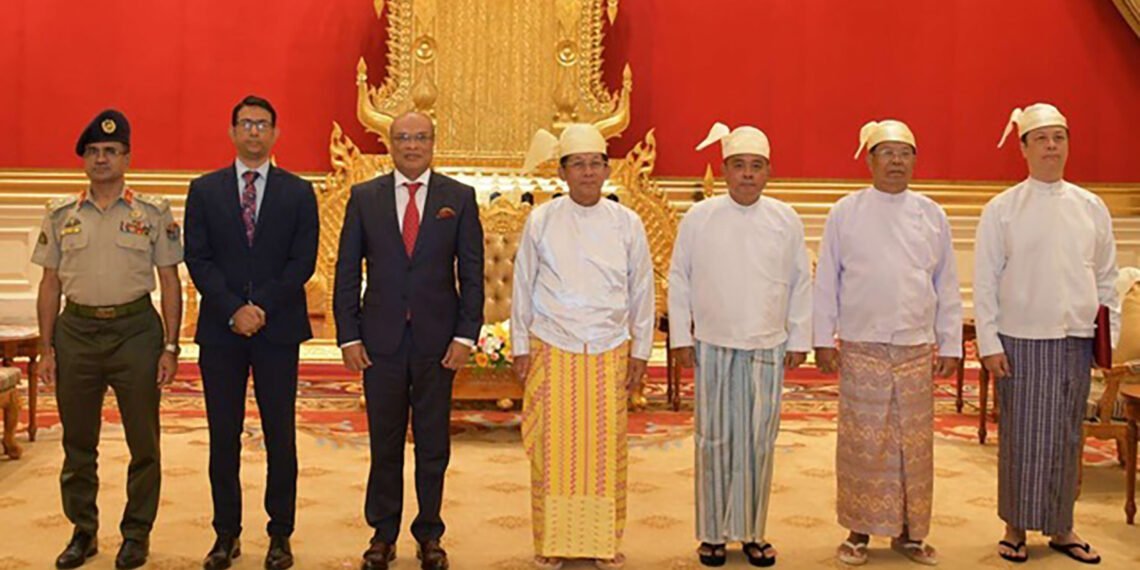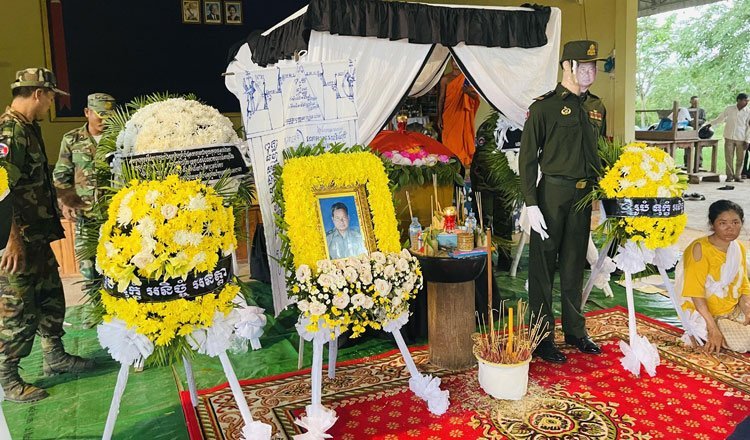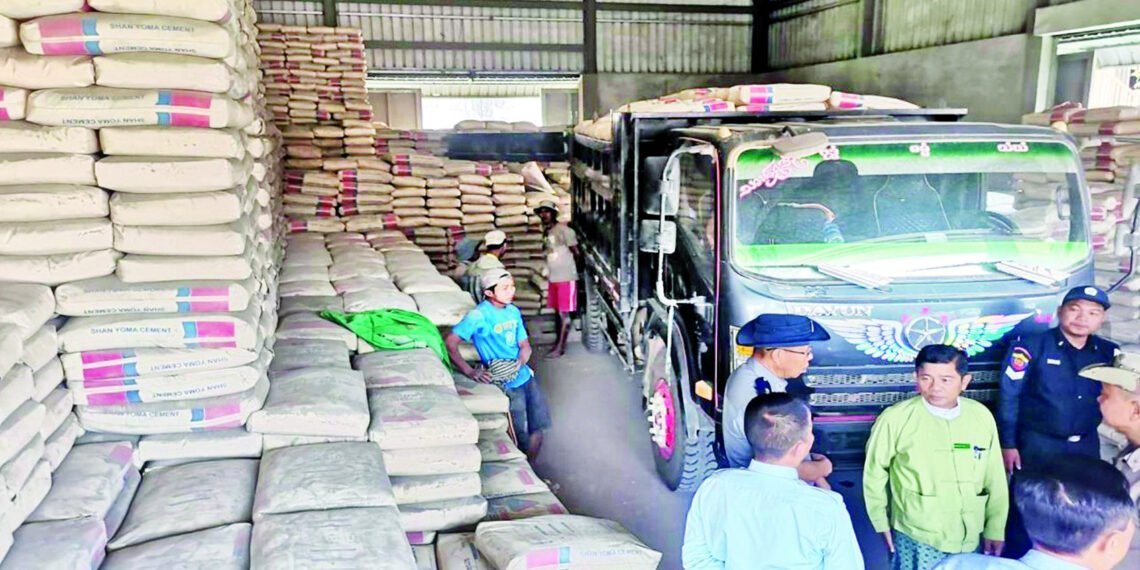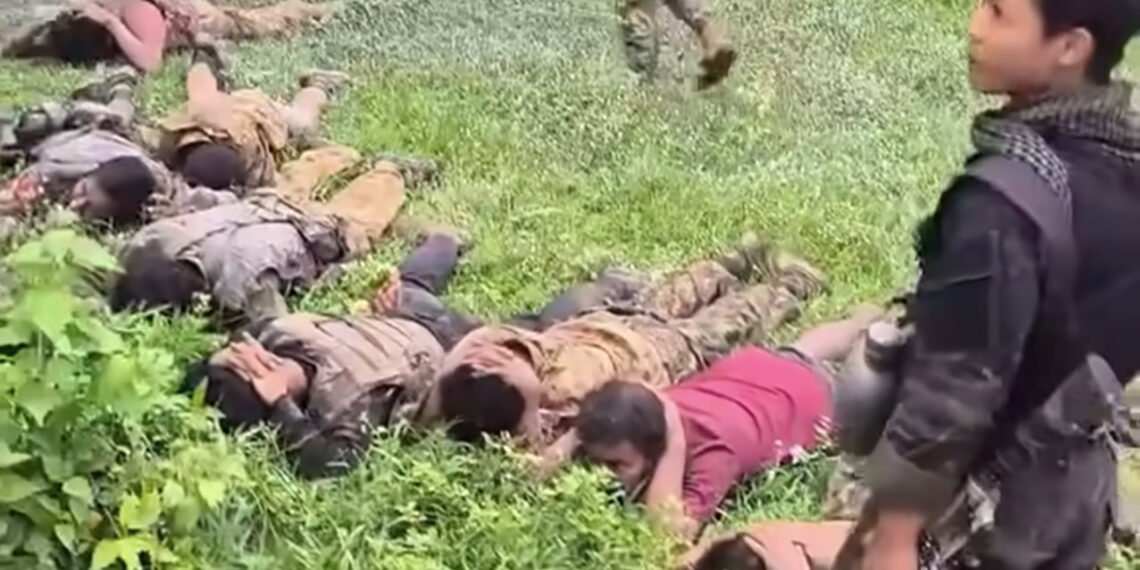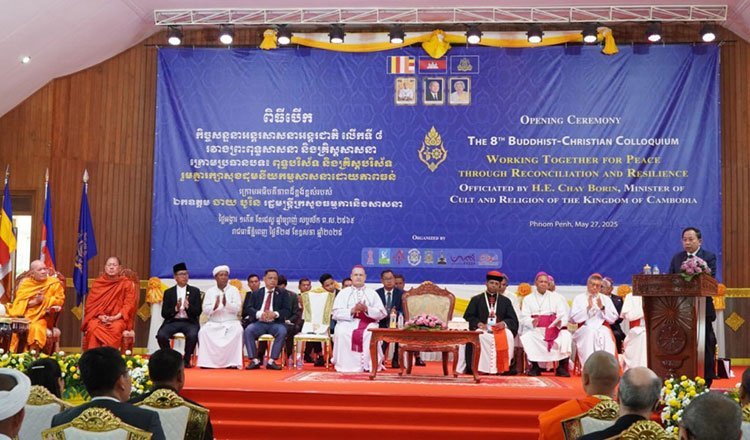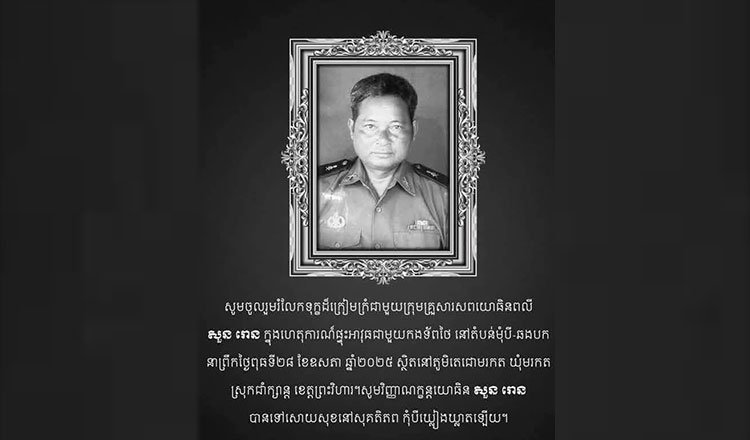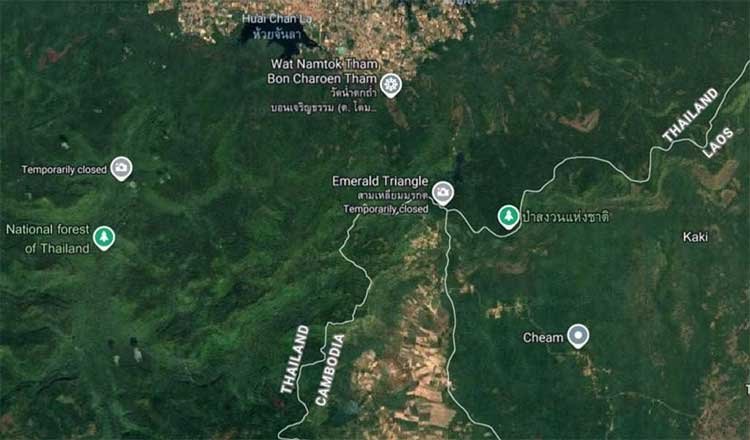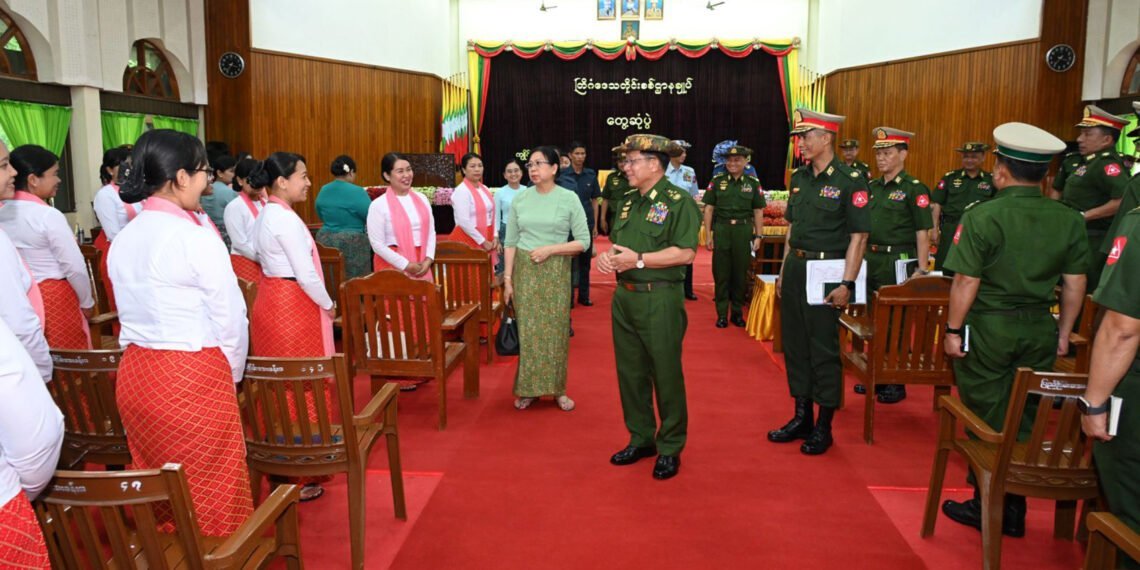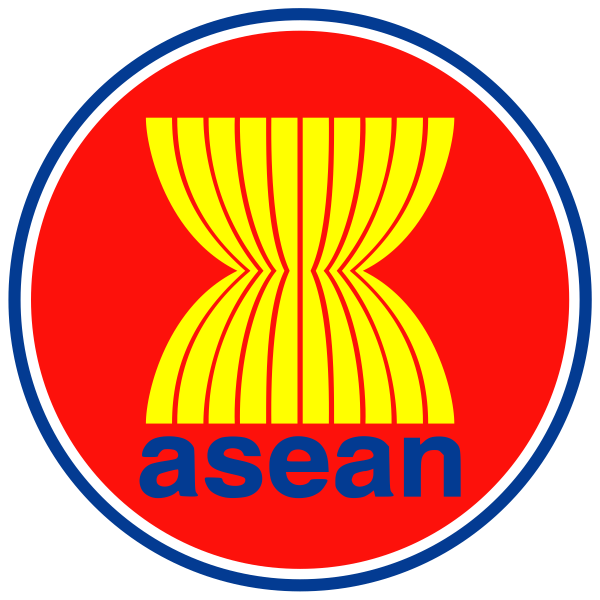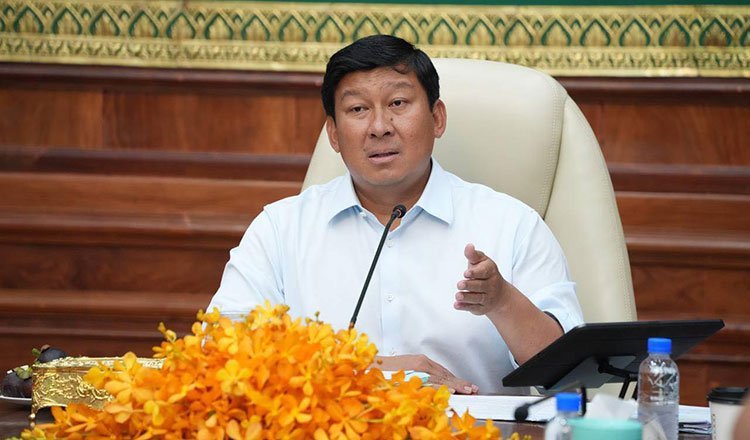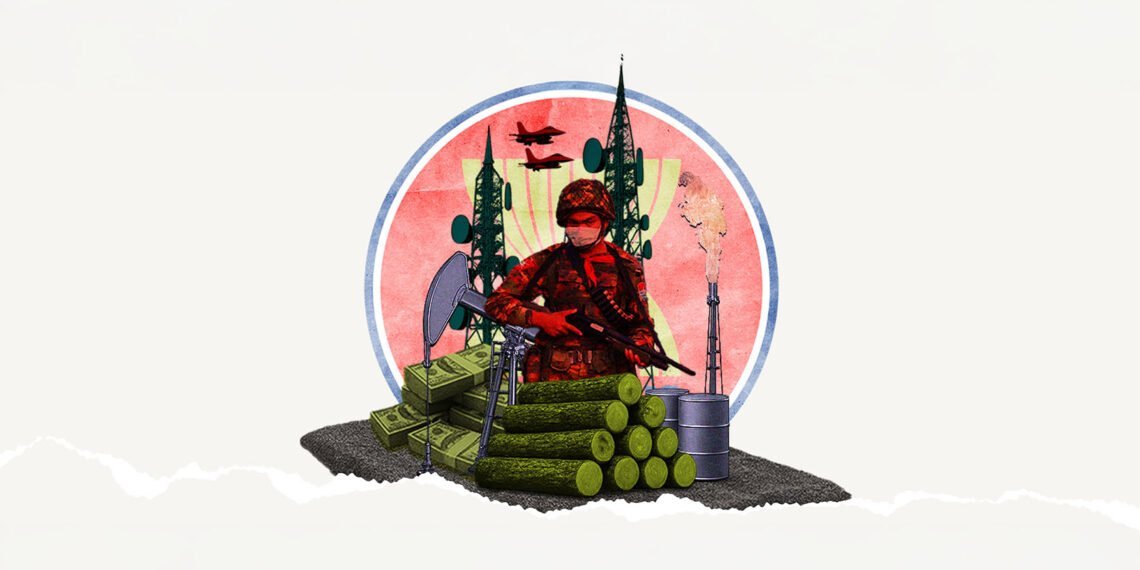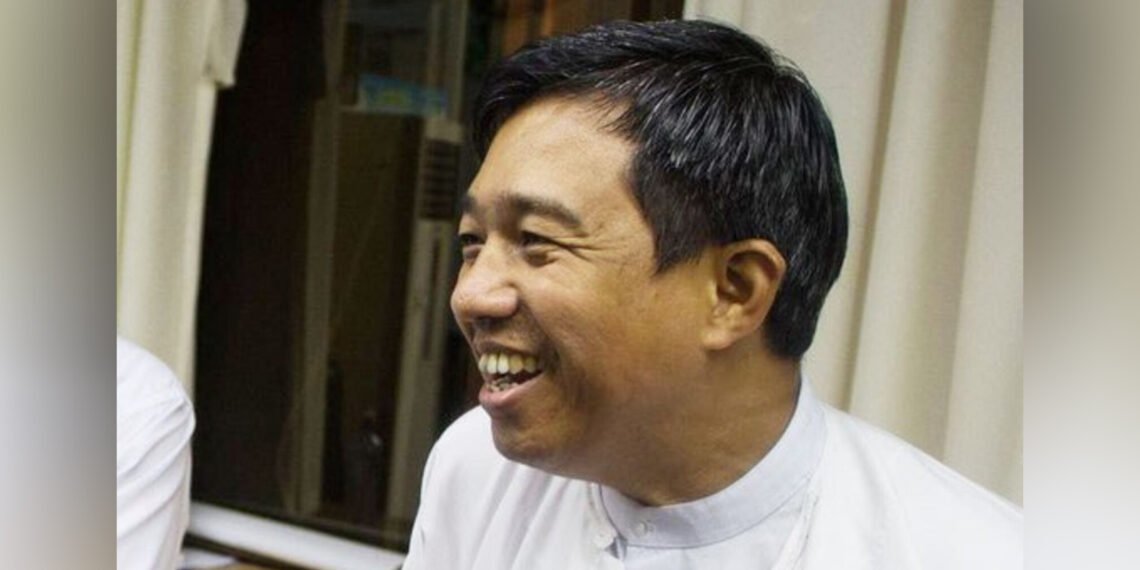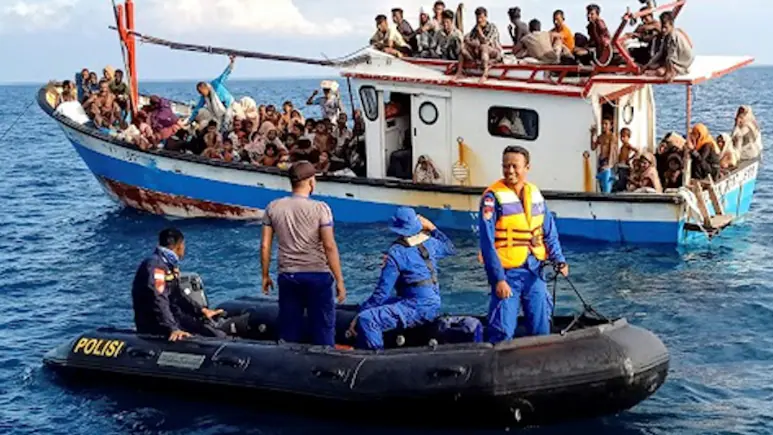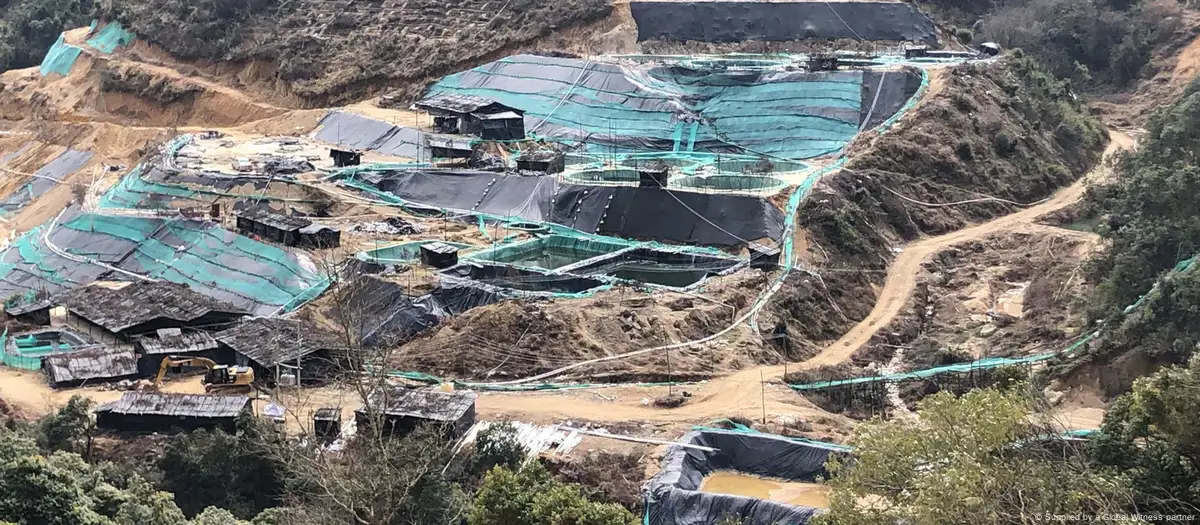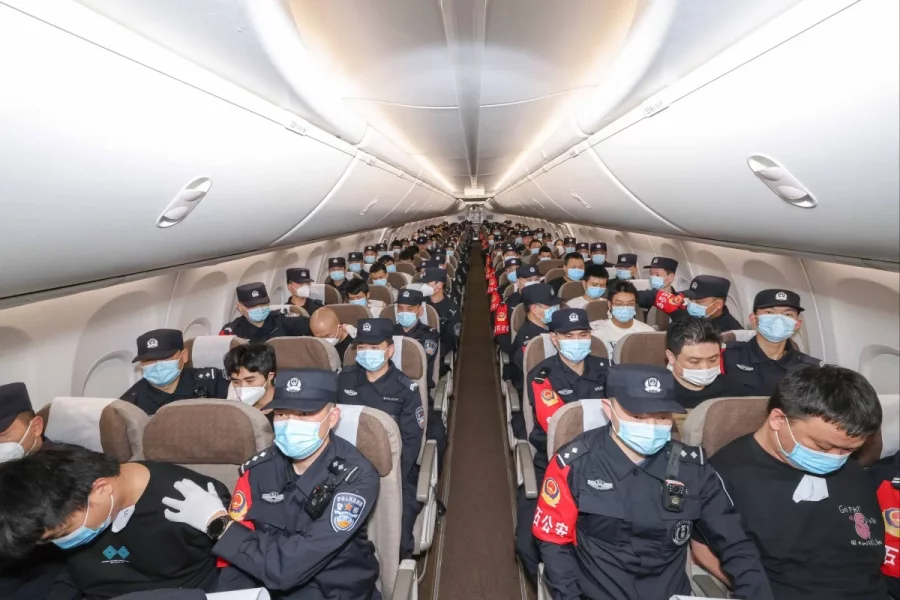-
Posts
15,797 -
Joined
-
Last visited
Content Type
Events
Forums
Downloads
Quizzes
Gallery
Blogs
Everything posted by geovalin
-
Cambodian authorities have raided a suspected phone scam base in Poipet, detaining more than 20 Japanese nationals believed to be involved in large-scale fraud targeting victims in Japan. The bust, which took place on 27 May in the north-western Cambodian city near the Thai border, followed a tip-off from police in Japan’s Aichi Prefecture. According to Japan’s National Police Agency (NPA), those arrested are suspected of impersonating Japanese police officers in phone calls designed to dupe victims into handing over cash under the guise of a criminal investigation. Computers, smartphones, and other equipment were seized during the operation. The building, situated among low-rise offices and dormitory-style lodgings, was reportedly fortified with multiple security gates, hinting at an organised operation. Victims were told their bank accounts had been linked to crime, and were pressured to prove their innocence by transferring funds—a tactic seen in nearly 1,900 confirmed fraud cases across Japan in the first three months of this year alone. Losses are estimated at over 17 billion yen (roughly £94 million). Aichi police revealed the tip-off came from a 21-year-old Japanese man who had unwittingly joined the scam. Recruited through a part-time job ad, he was flown to Thailand last December, then transported by car across the border to Poipet. There, under the control of Chinese supervisors, he and over 20 other Japanese were instructed to carry out the fraudulent calls. The man managed to return to Japan in January and reported his experience to police. This raid is part of a broader crackdown across Southeast Asia, where fraud bases exploiting Japanese nationals have proliferated. Since 2019, 178 Japanese citizens have been detained in similar operations in Cambodia, Vietnam, Thailand, and the Philippines. Many are believed to have been coerced into participating, lured by deceptive job offers and then trapped under tight security. Japanese investigators will now travel to Cambodia to support the inquiry and verify the identities of those detained, amid growing concern over cross-border scam networks exploiting vulnerable recruits. -2025-05-31
-
CJ Myanmar’s military regime is turning to seized contraband to plug a widening hole in its public finances, announcing plans to auction off thousands of confiscated goods as it grapples with a growing budget deficit. Deputy junta chief Soe Win this week urged officials to preserve the condition of seized items—mostly unlicensed vehicles, motorbikes, and imported machinery—so they can be resold swiftly to raise revenue. Since 2022, the junta claims to have seized goods worth over 575 billion kyats across 22,000 incidents. “We must take rapid legal steps so these goods can be sold to support the national budget,” said Soe Win, who also chairs the regime’s Illegal Trade Eradication Committee. Smuggling has surged as official border trade grinds to a halt in conflict-hit areas. Traders say the system is rife with extortion, where high taxes and opaque checkpoint fees make legal trade nearly impossible. “Even after paying taxes, junta checkpoints may seize our goods and demand bribes,” one Thai-Myanmar border trader told The Irrawaddy. “If you can’t pay, they’ll just take everything.” Sources say auctions will focus on unclaimed vehicles and cargo, with proceeds funnelled directly into junta coffers. In Hpa-an and Kawthaung, authorities reportedly conduct regular seizures to meet internal quotas, sometimes confiscating hundreds of trucks or goods worth up to 1 billion kyats per month. Meanwhile, junta leader Min Aung Hlaing is also tapping wealthy allies. At a second fundraising ceremony in Naypyitaw this week, cronies including tycoon Maung Weik and aviation mogul Aung Aung Zaw handed over nearly US$34 million in "donations" for earthquake relief—despite mounting evidence that junta airstrikes continue unabated in rebel-held areas. More than 3,700 people died in the March 28 quake, with survivors in Mandalay and Sagaing still sheltering in school buildings. Many are now being told to leave as schools reopen, even though debris from the disaster remains uncleared. As the junta scrambles for funds through auctions and elite donations, its grip on both the economy and the public continues to falter. -2025-05-31
- 1 reply
-
- 1
-

-

Top Myanmar Junta General Killed as AA Closes in on Key Port
geovalin posted a topic in Myanmar News
AA desk A top Myanmar junta general has been killed near the strategic port town of Kyaukphyu, as the Arakan Army (AA) intensifies its assault on the Chinese-backed investment hub in western Rakhine State. Brigadier General Kyaw Myo Aung, a senior strategist with the army’s Division 11, was reportedly shot dead on Monday by AA snipers along with a fellow officer. His body was flown to Yangon the following day and buried with military honours on Thursday, according to funeral notices shared online. The general’s death marks a major blow to the military regime, which is struggling to hold ground in a fast-shrinking area of control. The AA has reportedly seized multiple junta positions near Pyaing Si Kay village, just 5km south of Kyaukphyu, with battles raging around key police and military installations. Fighting has also flared close to China’s oil and gas terminals, part of Beijing’s multibillion-dollar Belt and Road Initiative. The port in Kyaukphyu links China’s Yunnan province to the Indian Ocean and is considered a strategic priority for Beijing. According to local reports, Chinese private security contractors are now directly assisting junta forces, including through drone operations. The Irrawaddy, which first reported the developments, could not independently verify these claims. This comes after Myanmar’s regime passed a law in February allowing foreign armed security firms to operate domestically. Chinese personnel have since been deployed to safeguard infrastructure around the port. Regime administrators are reportedly fleeing the area as the fighting intensifies, with the military resorting to airstrikes, naval support, and ground reinforcements to defend the port. The AA, which began its offensive in November 2023, claims to have taken control of 14 out of 17 townships in Rakhine State, as well as the neighbouring Paletwa Township in Chin State. It now has its sights set on the state capital, Sittwe. Civilians have borne the brunt of the military’s response, with airstrikes on towns under AA control resulting in numerous casualties, even as the conflict continues to spill into central Myanmar. -2025-05-31-
- 2
-

-
Myanmar junta leader Min Aung Hlaing is once again turning to superstition in a bid to secure his long-coveted presidency, as the country braces for military-staged elections in December. Over the weekend, the general visited Kengtung in eastern Shan State—an area with personal significance from his days as commander—where he performed a high-profile yadaya ritual, a form of Burmese occult practice aimed at warding off misfortune and summoning good luck. The centerpiece of this latest ritual was the enshrinement of a bejeweled crown, symbolically linked to the regalia of Burmese monarchs, at Lawkatharaphu Pagoda. Min Aung Hlaing and his wife presented the crown to Vasipake Sayadaw, a reclusive monk and spiritual adviser known for his influence over the general and his silent vows. Their association dates back to the early 2000s and has involved numerous rituals, including alleged instructions to security forces during the 2021 coup crackdown. Widely interpreted by the public as an attempt to enhance his political fortune through supernatural means, the crown offering is seen as an effort to conjure legitimacy and victory ahead of the regime’s planned election. Critics view it as another example of how Myanmar’s military rulers intertwine religion, ritual, and repression. Min Aung Hlaing’s obsession with astrology, numerology, and magical emblems is well-documented. In the past, he has consecrated pagodas in both Myanmar and abroad, unveiled a giant ruby and white elephant—symbols of divine favor—and commissioned the world’s tallest sitting Buddha in Naypyitaw, each move carefully timed with political events or crises. After natural disasters like the March 2024 earthquake and 2023’s Cyclone Mocha, his response was often more religious than humanitarian. Observers noted that his rituals consistently coincided with major threats to his power, including armed resistance movements and international condemnation. His aspirations to become president were thwarted in 2020, when the National League for Democracy (NLD) scored a landslide victory. The subsequent coup and dissolution of opposition parties, including the NLD and the Shan Nationalities League for Democracy, have cleared a path for the military-backed Union Solidarity and Development Party (USDP) to dominate the December poll. Still, Min Aung Hlaing appears unwilling to leave his fate entirely to political engineering. His repeated invocations of “Aung Pi!” (“We did it!”) during ceremonies have come to symbolize his reliance on yadaya to defeat not just political rivals, but growing public resentment and armed resistance. Whether this fusion of mysticism and militarism will deliver him the presidency remains to be seen, but to many in Myanmar, his rituals are a surreal yet chilling echo of the military’s long history of ruling not just by force, but by fate. -2025-05-30
- 1 reply
-
- 1
-

-
MOI Bangladesh has recalled its ambassador from Myanmar, deepening diplomatic tensions following Dhaka’s confirmation that it has opened communication channels with a rebel army fighting Myanmar’s military junta. Ambassador Monowar Hossain, stationed in Naypyidaw since mid-2023, was instructed to return to Dhaka immediately, according to a Bangladeshi foreign ministry official who called it an "administrative decision" without elaborating. The move follows last week’s admission by Bangladesh’s National Security Adviser, Khalilur Rahman, that the government has engaged in informal talks with the Arakan Army—an ethnic armed group active in Myanmar’s western Rakhine state—in an effort to stabilise the border region. The Arakan Army has been engaged in fierce conflict with Myanmar’s ruling junta, which seized power in a 2021 coup. Myanmar has not officially responded to the diplomatic withdrawal, and junta spokespeople have so far remained silent. Relations between the two countries have long been strained by the Rohingya refugee crisis. More than 1.2 million Rohingya Muslims have fled Myanmar’s military crackdown, with many now living in overcrowded camps in southern Bangladesh. Dhaka reports that over 130,000 more people have crossed the border in the past year alone. The humanitarian situation in Rakhine is worsening, with the United Nations warning of widespread hunger and displacement, raising fears of another mass exodus. Rahman said Bangladesh continues to engage both the junta and international agencies to find a long-term resolution, including exploring a U.N.-led humanitarian corridor in the conflict-hit region. However, Bangladesh’s military has voiced concern. “The army will not be involved in any activity that compromises the country’s security,” said Colonel Shafiqul Islam, in response to the corridor proposal. While Dhaka maintains that its outreach to the rebels is aimed solely at ensuring border stability, the rare diplomatic move of recalling an ambassador suggests a recalibration of strategy as tensions mount both within Myanmar and along its volatile frontier. -2025-05-30
- 1 reply
-
- 1
-

-
A Cambodian soldier fatally shot in a border clash with Thai forces has been laid to rest, as military and political leaders from both nations work to de-escalate the sudden spike in tensions. Master Sergeant Suon Raun, 47, died in a brief but deadly exchange of gunfire in the early hours of 28 May in the disputed Mom Bei area near Preah Vihear. The skirmish, which lasted around ten minutes, has sparked a flurry of diplomatic and military activity as both sides accuse the other of firing first. The Cambodian government has insisted the incident took place within its territory, while Thai officials maintain it occurred on their side of the border in Ubon Ratchathani. The zone has long been a flashpoint and was previously agreed upon as a no-occupation area. Suon Raun’s funeral was held with full military honours, attended by grieving family members and senior officials. Responding to an appeal by Senate President Hun Sen, several philanthropists donated to support the soldier’s family. Prime Minister Hun Manet, speaking from Japan where he was on an official visit, reaffirmed his control over the military response and called for calm. “All strategic decisions remain under my authority,” he said, adding that while Cambodia would defend its sovereignty, peaceful dialogue remains the priority. Thai Prime Minister Paetongtarn Shinawatra also urged restraint. “We don’t want this to escalate. We’re committed to resolving this peacefully,” she said, describing Cambodia’s deployment of backup forces as a normal defensive step. Senior commanders from both armies met yesterday at the O’Smach border crossing in a bid to ease tensions and improve communication between frontline troops. The mood remains cautious but cooperative. While both governments have made clear their desire to avoid war, the incident has reignited sensitive memories of previous clashes and territorial disputes. For now, the focus is on diplomacy—but with forces still positioned near the border, the risk of renewed violence has not yet passed. -2025-05-30
-
Police A Chinese hotel owner in Phnom Penh has been formally charged with fatally beating an employee during a workplace row, in a case that has shocked Cambodia’s hospitality sector. The incident took place on 21 May at a Chinese-owned hotel in Tonle Bassac, Chamkar Mon district. According to police, 32-year-old Yuan Bao Dong, the hotel’s owner, attacked his 36-year-old staff member—also Chinese—following a heated dispute over alleged negligence. Investigators say the confrontation escalated when the victim attempted to strike back after being insulted by Yuan. The employer allegedly retaliated with a steel rod, striking the man repeatedly in the head. The victim later died from his injuries at Calmette Hospital. The Phnom Penh Municipal Court issued a warrant on 29 May, charging Yuan with “Intentional Acts of Violence with Aggravating Circumstances” under Article 224 of Cambodia’s Criminal Code. If found guilty, he faces a prison sentence of seven to ten years. Yuan was arrested on 26 May by local police and is currently being held in pre-trial detention. Deputy Police Chief Major Chhim Saveth confirmed that Yuan had confessed to the attack, telling officers the altercation stemmed from frustrations over the victim’s poor performance at work. The case has raised concerns about worker protections and employer conduct in Cambodia’s fast-growing hotel industry, which employs many foreign nationals. Local authorities have yet to comment on whether the hotel remains operational or whether further action will be taken. The investigation is ongoing. -2025-05-30
-
April 2025 Reconstruction efforts following the devastating March 28 earthquake in Myanmar are being severely hampered by skyrocketing cement prices and supply shortages, particularly in the worst-hit regions of Mandalay, Naypyitaw, and Sagaing. Before the quake, a sack of cement cost around 17,000 kyats (US$4). Prices have since surged to as high as 40,000 kyats in some areas, builders report. Although the regime pledged to subsidize cement for recovery, this relief appears limited to select locations in Naypyitaw. “There are long lines and a 10-sack-per-person limit where government-subsidized cement is available. In most places, it’s overpriced or unavailable,” one resident told The Irrawaddy. In Sagaing, where many shops were damaged or shuttered by the quake, long queues have formed at the few stores still operating. “We’re forced to pay whatever price we can find to keep working,” said a local contractor. The scarcity is compounded by a drop in cement production. Only six of Myanmar’s nine cement plants are currently operational, producing just 340,000 sacks daily, far below demand. Even in Mandalay, where smaller outlets continue to sell limited quantities, prices have spiked above 30,000 kyats. Bricks have also doubled in cost. The Indian government has donated 4,500 sacks of cement, but locals fear it will be allocated mainly to state-managed projects in Naypyitaw, not to broader public recovery. The building sector is also facing labor shortages. “We’re not constructing—only demolishing damaged structures,” said one construction source. “Even large suppliers are rationing.” Authorities say they’ve launched inspections of over 300 building supply outlets across major cities and filed price-gouging cases against more than 60 shops. Still, residents and contractors see little relief in sight. The crisis highlights broader economic dysfunction in post-coup Myanmar, where even disaster response is strained by inflation, broken supply chains, and uneven governance. -2025-05-29
-
- 1
-

-
Sun Poe Karen and Chin resistance forces have struck coordinated blows against Myanmar’s military, capturing dozens of troops, reclaiming key territory, and intensifying pressure near the Thai and Indian borders. In Karen State, the Karen National Liberation Army (KNLA) and allies ambushed around 72 junta reinforcements on Wednesday near Sone Si Myaing, close to the Thai border. The troops had reportedly passed through Thai territory en route to Thay Baw Boe, a strategic camp under rebel assault. Resistance forces claimed to have detained 30 junta soldiers alive, with others killed or fleeing. “We have seized weapons and are still clearing the area,” a KNLA source told The Irrawaddy. The junta responded with airstrikes, targeting villages near the Democratic Karen Benevolent Army (DKBA) headquarters. Five communities were displaced into Thailand, deepening the humanitarian toll. The battle is part of a broader campaign by Karen forces, who have retaken multiple former strongholds this month, including Maw Phoe Kay and Htee Hkee. These offensives mark a sharp escalation in the civil war, particularly in territory once thought secure by the military regime. Meanwhile, in Chin State, anti-junta forces are resisting a major push by some 800 junta troops attempting to seize Tedim town from the south. Fighting has intensified since May 18, with Chin resistance capturing nine soldiers and forcing at least 20 desertions. Salai Htet Ni, spokesman for the Chin National Army, said the goal is to prevent the military from reclaiming lost territory ahead of elections tentatively promised for late 2024. “Despite internal differences, we are uniting to block their advance,” he said. Battles along the Kale-Tedim road have displaced over 1,000 civilians, as the junta targets villages in an effort to establish a base near Taingen—a strategic junction leading to Indian border towns. Military analysts believe the junta is now facing a more coordinated and determined resistance than at any point since the 2021 coup, as ethnic armed groups across Myanmar align their campaigns and intensify pressure on the regime. -2025-05-29
-
CSC A senior Vatican figure has called on Buddhists and Christians to deepen cooperation for peace, highlighting shared values that can help address today’s global challenges. Cardinal George Jacob Koovakad, Prefect of the Dicastery for Interreligious Dialogue, made the remarks at the 8th Buddhist-Christian Colloquium held in Phnom Penh. The event, themed “Working Together for Peace through Reconciliation and Resilience”, brought together religious leaders committed to confronting issues such as conflict, poverty, and environmental degradation. “Reconciliation and resilience are deeply rooted in both Buddhism and Christianity,” said Cardinal Koovakad. “They form the foundation for building peace and healing all crises. We must say no to war and yes to peace.” Bishop Olivier Schmitthaeusler, Apostolic Vicar of Phnom Penh, underscored the Catholic Church’s contribution to peacebuilding in Cambodia, despite its modest size—comprising roughly 20,000 members, 80 priests, and 200 religious personnel. He expressed gratitude to the Cambodian government for its consistent support, which has enabled religious communities to thrive and play active roles in promoting peace. Chay Borin, Minister of Cults and Religion, who presided over the event, echoed the sentiment. He praised Cambodia’s stability and respect for religious freedom, saying, “Peace is essential, and maintaining and promoting it is a shared responsibility for all.” The colloquium served as a reminder that, despite differing doctrines, the world’s faiths can stand together in the face of division and uncertainty. With Cambodia as host, the message was one of unity, mutual respect, and a collective commitment to building a more peaceful world. -2025-05-29
-
Tensions flared on the Cambodia–Thailand border yesterday morning as troops from both sides exchanged gunfire in a long-disputed area, leaving one Cambodian soldier dead and sparking urgent diplomatic efforts to prevent further escalation. The incident occurred at around 5:30am near Chong Bok, a contested zone in Thailand’s Ubon Ratchathani province. Thai military officials claim Cambodian forces entered a no-occupation zone in violation of a bilateral agreement. A Thai patrol allegedly approached to engage in routine dialogue, but was met with gunfire—prompting a 10-minute exchange. Thailand’s Major General Winthai Suvaree said the Thai soldiers returned fire only after being shot at, while Cambodia’s Major General Mao Phalla insisted details of the clash remain unclear, noting such accusations were “not new.” The firefight resulted in the death of 47-year-old Cambodian Master Sergeant Soun Roan. Cambodia’s Ministry of Defence asserts the gunfire erupted on their side of the border—in Preah Vihear province—noting that Cambodia does not seek conflict, but is prepared to defend its territory. Both militaries rapidly established communication and agreed to a ceasefire. Senior commanders are now engaged in negotiations to de-escalate tensions and prevent further incidents. The region has seen sporadic border flare-ups over the years, most notably between 2008 and 2011 during the Preah Vihear temple dispute. Those clashes caused casualties, displaced civilians, and strained diplomatic ties until an International Court of Justice ruling in 2013 affirmed Cambodia’s sovereignty over the temple area. Cambodian leaders, including Prime Minister Hun Manet and Senate President Hun Sen, have urged restraint while defending the nation’s right to territorial integrity. Hun Sen warned against fuelling nationalist sentiment, drawing parallels to the politically charged violence of the past. As both sides pursue talks, experts caution against allowing political opportunists to exploit the incident. Pou Sothirak, a senior advisor at the Cambodia Centre for Regional Studies, emphasised the need for level-headed diplomacy and public transparency to prevent a spiral into renewed conflict. For now, the guns have fallen silent—but the border remains tense, and the shadow of past wars looms large. -2025-05-29
-
A Cambodian soldier has been killed in a brief but deadly exchange of fire with Thai troops near the disputed border area of Mom Tei, officials confirmed on Tuesday. The firefight erupted in the early hours of 28 May and lasted around ten minutes before commanders on both sides enforced a ceasefire by phone. The victim, 48-year-old Suon Roun, was part of a Cambodian patrol near the Preah Vihear province border. Cambodian officials say Thai forces launched an unprovoked attack on a long-held position in Techo Morakot village, Choam Ksan district. In contrast, Thai authorities claim Cambodian troops entered their territory and opened fire first, prompting what they described as a defensive response. The conflicting narratives have added fuel to a sensitive territorial dispute between the two Southeast Asian neighbours. While minor tensions are not uncommon along the contested border, fatalities are rare and often trigger diplomatic strain. “This clash is not something Cambodia desires,” the Ministry of National Defense said in a statement, reaffirming its commitment to peace but vowing to defend the nation’s territorial integrity “at all costs”. Efforts are now under way to defuse the situation. Talks between senior defence officials from both countries are expected in the coming days, with both sides publicly calling for restraint. Cambodia has also issued a strong warning to the public not to spread unverified information online, fearing that misinformation could inflame tensions and disrupt ongoing negotiations. The border surrounding Preah Vihear has long been a point of contention, notably flaring into violent clashes in the late 2000s. Although cooperation has improved in recent years, Monday’s firefight underscores how fragile that peace remains. The Thai government has yet to release an official statement. Regional observers are watching closely to see whether this incident is swiftly resolved — or becomes a flashpoint in an already delicate relationship. --2025-05-28
-
RFA Cambodian police have announced plans to request the extradition of a woman who publicly criticised the government’s trade talks with the United States, escalating concerns over free speech and political persecution. The woman, identified as Chhin Chou from Battambang province, posted commentary online under the alias “Overseas Woman”, suggesting that recent trade negotiations with the U.S. had failed due to Cambodia’s poor human rights record. She warned that the second round of talks, due in June, would likely meet the same fate unless reforms were made. Her remarks targeted Cambodia’s commerce minister and highlighted concerns that the U.S. may maintain a punitive 49% tariff on Cambodia’s key garment and footwear exports. The United States is Cambodia’s top export market, and reaching a deal is critical for Prime Minister Hun Manet’s government. In response, Cambodian national police accused Chhin Chou of incitement and attempting to overthrow the government. They have confirmed they are working to have her extradited from Thailand, where she is believed to be residing. Thailand has previously cooperated quietly with Cambodian authorities in returning political dissidents — often drawing criticism from international human rights groups. However, in this case, Cambodian police have uncharacteristically named the suspect publicly. Thailand’s immigration bureau said on Monday it had not yet received a formal arrest request. Ny Sokha, head of the Cambodian rights group Adhoc, defended Chhin Chou’s right to speak out. “This is not a criminal offence,” he said. “Freedom of expression is clearly protected by Cambodia’s constitution and international law.” The case adds to a growing list of government crackdowns. Human Rights Watch reported that at least 94 critics were arrested in Cambodia last year for “incitement” or “treason”. Among them is journalist Ouk Mao, who reported on illegal logging and was arrested without a warrant earlier this month. He was released on bail Sunday but still faces multiple charges. As the Cambodian government tightens its grip on dissent, the fate of Chhin Chou — and others who speak out — may signal just how far authorities are willing to go to silence critics beyond their borders. -2025-05-28
-
Cambodia’s Ministry of Health has confirmed the death of an 11-year-old boy from the H5N1 strain of bird flu, marking a grim reminder of the virus's continued threat to human life. The child, from Srey Sampoung Village in Kampong Speu Province, tested positive for the virus on 27 May at the Pasteur Institute of Cambodia. Despite emergency treatment, he died the same day after being admitted in a critical state, suffering from severe respiratory symptoms. Investigations revealed that poultry near his home had been dying in the week leading up to his illness. Officials believe this was likely the source of the infection. In response, Cambodia’s health and agriculture authorities have launched an urgent containment effort. Emergency teams are tracing contacts, distributing antiviral medication, and stepping up public awareness campaigns in the affected area to prevent further human cases. The Ministry has urged the public to remain vigilant, particularly those in contact with poultry. It warned that anyone experiencing fever, cough, or difficulty breathing after exposure to sick or dead birds should seek medical care immediately — delays, they stress, can be fatal. Bird flu, also known as avian influenza, primarily spreads from infected birds to humans through direct contact. While it is not easily transmitted between people, health experts warn that mutations could pose a broader pandemic risk. Authorities have issued renewed guidance on prevention: avoid touching or consuming sick or dead birds, wear protective gear when handling poultry, practise strict hygiene, and ensure all meat and eggs are fully cooked. Though Cambodia has seen sporadic human infections in the past, this latest case has reignited concern over the virus’s potential to resurge, particularly in rural communities where contact with poultry is common. The Ministry of Health says it will continue to update the public through official channels as investigations and response measures continue. -2025-05-28
-
MOI Myanmar’s military ruler, Min Aung Hlaing, has kicked off what appears to be a thinly veiled presidential campaign, urging troops to support candidates aligned with the junta in December’s widely discredited election. The coup leader made the appeal during a visit to military families in Kengtung, Shan State, positioning himself and his proxy party — the Union Solidarity and Development Party (USDP) — at the centre of the upcoming vote. Though he has pledged to hand over power to the election’s winner, critics say the process is a farce, designed to cement military dominance. The USDP, packed with former army officers and chaired by ex-Brigadier General Khin Yi, is expected to sweep the poll following the dissolution of major pro-democracy parties, including Aung San Suu Kyi’s National League for Democracy (NLD). The NLD won the last democratic election in 2020 by a landslide before being ousted by the military the following year. Observers believe Min Aung Hlaing is setting the stage to secure the presidency through the parliament, which is heavily influenced by the military. Under the 2008 junta-drafted constitution, military appointees control a quarter of all seats and will vote alongside elected MPs. With the NLD and other rivals barred, the USDP is expected to dominate, effectively ensuring his victory. The planned election has drawn sharp condemnation both at home and abroad. The civilian-led National Unity Government and many in Myanmar view it as a sham. Western governments have echoed those concerns, while ASEAN has shown division: Malaysia has warned that voting amid violence and repression risks further delegitimising the process. Only around 25% of the country is believed to be under junta control, and even the regime admits its census failed to count over half of the population. Nevertheless, 54 parties — mostly military-aligned — have been approved to run, with campaign activities already under way. As the military seeks to present a veneer of electoral legitimacy, critics warn the upcoming vote could entrench authoritarian rule rather than restore democracy. For Min Aung Hlaing, however, the ballot may be the final step in converting his coup into a presidency. -2025-05-28
-
Southeast Asian leaders have called for an extended and expanded ceasefire in Myanmar, as the country reels from escalating violence and a devastating earthquake. The appeal came in a joint statement issued today following a high-level ASEAN meeting. The 7.7-magnitude earthquake that struck central Myanmar on 28 March 2025 has only worsened an already dire humanitarian crisis. Amid deepening conflict and civilian suffering, ASEAN leaders urged all parties to halt violence immediately and protect non-combatants. Central to the bloc’s position is the Five-Point Consensus, a framework agreed in 2021 but largely unfulfilled. ASEAN reiterated that it remains the main pathway to peace in Myanmar. Leaders stressed that any solution must be "Myanmar-owned and Myanmar-led," reflecting the bloc’s principle of non-interference, while pushing for real progress on the ground. Notably, ASEAN welcomed recent ceasefires declared by both the Myanmar military and various opposition groups. However, it called for these truces to be extended and expanded nationwide as a first step towards broader peace efforts. This, they say, is essential for creating safe conditions to deliver aid and start meaningful national dialogue. The statement also highlights the need for unimpeded and transparent humanitarian assistance, including cross-border aid where necessary. ASEAN's humanitarian arm, the AHA Centre, is working alongside local and international agencies to coordinate efforts based on on-the-ground assessments. ASEAN’s appeal includes a broader call to the international community — especially the United Nations — to continue backing the regional peace effort. The bloc pledged deeper cooperation with neighbouring countries and external partners to address wider regional fallout, including a spike in drug trafficking, human smuggling, and cybercrime linked to the unrest. While progress remains uncertain, today’s unified call signals ASEAN’s growing urgency to see meaningful change — and a rare moment of consensus on one of the region’s most intractable crises. -2025-05-28
-
Say Samal Cambodia is setting its sights on turning its southern coastline into a major economic engine, with the government pushing forward a plan to transform four coastal provinces into a unified development corridor. At a high-level meeting last week, Deputy Prime Minister Say Samal, who also chairs the National Committee for Cambodia Coastal Management and Development (NCMD), outlined a bold vision to create jobs, drive investment, and improve livelihoods across Koh Kong, Kampot, Kep, and Preah Sihanouk. “Our aim is to deliver real improvements—not just promises,” said DPM Samal. “We want communities to thrive with stable incomes, good health, and clean environments.” Infrastructure and Human Capital at the Core Central to the strategy is a focus on infrastructure—roads, electricity, and water—as well as the development of skilled local workforces capable of supporting industries like tourism, logistics, and fisheries. The initiative is part of a broader plan launched in January to integrate the coastal provinces into a single economic corridor. By connecting these regions more efficiently and encouraging sustainable investment, the government hopes to unlock the full value of Cambodia’s coastline. Balancing Growth with Preservation Officials stress that development must be inclusive and environmentally responsible. The region’s beaches, biodiversity, and fishing communities are seen as both economic assets and national treasures. “We must promote tourism and trade without compromising our cultural and natural heritage,” Samal told the committee, calling for cooperation across ministries and provincial administrations. From Potential to Reality The coastal zone has long been hailed as central to Cambodia’s economic future. With renewed political will and coordination, the government hopes to convert years of untapped potential into real opportunities for local people. If successful, the corridor could become a model for balanced, sustainable development—linking economic ambition with community resilience. -2025-05-27
-
Image generated by Maria Renée Rada using ChatGPT Cambodia’s latest population census reveals both progress and pressing challenges for the country’s future, with gaps in literacy, skills, and access to education threatening long-term economic growth. Released last week by the Ministry of Planning, the 2024 Cambodia Inter-censal Population Survey (CIPS) offers a sobering look at the realities behind the numbers. While literacy and vocational training have improved, persistent inequalities—especially in rural areas—suggest that without targeted reforms, Cambodia’s development may stall. Literacy Gap Widens for Women National literacy rose from 80.4% in 2019 to 85.6% in 2024, but the gender divide remains stark: 88.7% of men are literate compared to just 82.6% of women. The disparity is even more pronounced outside urban centres. The report warns that limited education for women weakens not only their job prospects but also their ability to support the next generation. Youth Dropouts and Lost Potential The data paints a troubling picture for school retention. Only 62.5% of 15–17-year-olds remain in school, dropping sharply to 22.1% among 18–24-year-olds. Many leave education due to poverty or the need to earn money, particularly in rural areas—locking families into cycles of low income and limited opportunity. Skills Gap Stifles Growth Despite nearly 30,000 completing vocational training at level 3, employers still report a mismatch between the skills young people gain and the needs of Cambodia’s growing sectors, including digital services, tourism, and manufacturing. This gap threatens the country’s ambitions to move beyond agriculture and garment production. English and Tech Divide Deepens Khmer-English literacy has more than doubled since 2019, but most gains are concentrated in cities. Rural Cambodians remain largely excluded from global job markets, hindered further by poor internet access and a lack of digital devices for learning. A Call for Urgent Action The census is more than a snapshot—it’s a roadmap. Experts urge investment in girls’ education, policies to reduce school dropouts, and reforms to vocational training aligned with real-world job demands. Expanding English education and digital access in rural areas is also critical. If acted upon, this data can help close Cambodia’s widening gaps—and unlock the potential of its rising generation. -2025-05-27
-
A damning new report has accused major Southeast Asian companies of enabling Myanmar’s military regime to carry out war crimes, including deadly airstrikes and artillery attacks on civilians. Justice For Myanmar (JFM), a prominent rights watchdog, has revealed that state-linked firms from Thailand, Singapore, Malaysia, Vietnam and Indonesia continue to supply the junta with vital funds, fuel, and technology—four years after a military coup toppled the country’s elected government. The report claims that this “network of corporate complicity” has not only defied Western sanctions but has also made a mockery of ASEAN’s own Five-Point Consensus for peace, which the regime has ignored. At the heart of the regime’s revenue, JFM says, is Myanma Oil and Gas Enterprise (MOGE), which remains untouched by ASEAN sanctions. Thai energy giant PTTEP and Singapore’s Interra Resources are named among firms generating millions for the junta via joint gas and oil ventures. The resulting funds, JFM alleges, are helping finance atrocities against Myanmar’s people. Fuel imports are another key enabler. Singapore’s Shoon Group and Vietnam’s Hai Linh are accused of continuing aviation fuel shipments—fuel that powers the junta’s escalating air attacks on resistance-held villages. Timber exports, real estate development, and military-linked banking operations also feed the regime’s coffers. Singapore’s Yoma Group, Malaysia’s MAMEE-Double Decker, and Vietnam’s Truong Hai Group are among those identified as leasing military-owned land, directly enriching junta-controlled enterprises. Vietnamese telecom giant Viettel, operating through Mytel, has allegedly helped the regime expand its surveillance capabilities, aided by Malaysian and Thai tech partners. Meanwhile, leading banks across ASEAN are accused of facilitating financial transactions for arms and fuel purchases, despite public denials of wrongdoing. JFM warns that ASEAN’s inaction is fuelling Myanmar’s deepening humanitarian crisis. “Without its corporate enablers, the junta would be choked of funds, arms, technology and aviation fuel,” the report states. The group is urging ASEAN governments to take decisive action against complicit firms. As the bloc’s peace efforts flounder, JFM says business interests must no longer take precedence over human lives. -2025-05-27
-
Myanmar’s Central Bank Dr Bo Bo Nge, the detained deputy governor of Myanmar’s Central Bank, has been awarded Bard College’s 2025 Laszlo Z. Bito Award for Humanitarian Service — a rare international recognition for a political prisoner still behind bars. Bo Bo Nge, an alumnus of the U.S.-based college, was honoured for his “resistance to injustice, violence, and authoritarian threats,” according to the award committee. The recognition highlights his continued imprisonment since 2021, following Myanmar’s military coup and subsequent crackdown on the elected National League for Democracy (NLD) government. A respected economist and key figure in Myanmar’s financial reforms, Bo Bo Nge was arrested in February 2021 and sentenced the following year to 20 years in prison under anti-corruption charges widely dismissed as politically motivated. The junta accused him of mishandling government funds and maintaining links with the Open Society Myanmar foundation, founded by George Soros. Colleagues and observers have long insisted on his innocence. Australian economist Sean Turnell, who worked with him in Myanmar, called the charges a “travesty” and described Bo Bo Nge as “utterly incorruptible”. His journey is as remarkable as it is tragic. First jailed in 1988 for student activism, he taught himself English in prison. He later fled to the United States, washed dishes to survive, and rose to academic prominence, earning degrees from Bard, Johns Hopkins, and SOAS, before returning home in 2016 to support Myanmar’s democratic transition. That choice has cost him his freedom. But from a prison cell, his reputation only grows — now internationally recognised not just for his intellect, but for his moral resolve. Turnell, writing after the award announcement, called him “Myanmar’s bravest and greatest economic reformer,” adding that Bo Bo Nge “languishes in prison... precisely because of his integrity and courage.” As Myanmar’s military continues its grip on power, voices like Bo Bo Nge’s — and the global honours that echo them — remain vital reminders of a democratic struggle not yet extinguished. -2025-05-27
-
- 2
-

-

-
archives January 2023 Up to 427 Rohingya refugees are feared drowned after two boats capsized off the coast of Myanmar earlier this month, in what the United Nations is calling the deadliest maritime disaster involving Rohingya this year. The twin tragedies occurred on 9 and 10 May, with the vessels carrying hundreds fleeing war and persecution in Myanmar’s Rakhine State and Bangladesh’s overcrowded refugee camps. The UN refugee agency, UNHCR, confirmed that only 87 survivors have been accounted for. “The UN Refugee Agency is gravely concerned,” said Hai Kyung Jun, UNHCR’s regional director for Asia and the Pacific. “These deaths were preventable, and highlight a deepening humanitarian emergency.” According to preliminary information, the first boat, carrying 267 people, sank on 9 May with just 66 survivors. The second vessel, with 247 aboard, capsized the following day — only 21 people made it out alive. The Rohingya, a stateless Muslim minority, continue to flee persecution, violence and collapsing humanitarian support. In Rakhine, renewed fighting between the military junta and the Arakan Army has made life even more precarious for civilians. Meanwhile, cuts to aid in camps like Cox’s Bazar are pushing many to take desperate measures. UNHCR reported that 657 Rohingya lost their lives at sea in 2024, a toll now set to climb sharply. The UN is urging regional governments to boost search and rescue capabilities, offer protection, and address the drivers of displacement. Without decisive action, the agency warns, more Rohingya will be lost to the sea — victims not just of shipwreck, but of global indifference. -2025-02-26
-
- 1
-

-
Global Witness Partners Myanmar’s rare-earths industry, fuelling the world’s green energy transition, is being powered by toxic extraction methods, environmental devastation and rampant exploitation, according to a sobering new investigation. In the northern Kachin state, Chinese-backed mining operations are using a hazardous method known as in-situ leaching, injecting chemicals like ammonium nitrate into mountain soils to flush out rare-earth minerals. What’s left behind, say local activists, is poisoned land, polluted rivers, and communities suffering in silence. “We can’t stay near the sites for more than 30 minutes — it’s hard to breathe,” said Lahtaw Kai, a Myanmar environmental campaigner whose name has been changed for her safety. “Workers are unprotected, often fall ill, and are simply replaced.” The sludge collected from the process contains not only rare earths, but a cocktail of harmful chemicals. Human rights observers describe scenes of toxic ponds leaking into water sources and hills stripped bare, with little to no regard for the people living nearby. Despite a 2018 export ban under Myanmar’s former civilian government, extraction surged after the 2021 military coup. The lucrative trade, worth $1.4 billion in 2023, now funds conflict, particularly in regions controlled by the Kachin Independence Organization (KIO), a powerful ethnic militia that has recently regained control of key mining zones. While the KIO is seen by locals as more legitimate than junta-aligned forces, the mining remains largely unregulated. “The environmental destruction is the same on both sides,” says a Global Witness report, urging immediate international attention. These minerals — including dysprosium, critical for electric vehicle batteries and wind turbines — end up in supply chains serving global firms like Volkswagen, Toyota, Siemens Gamesa and Hyundai, via Chinese magnet producers. As demand for rare earths surges, activists like Lahtaw Kai and Seng Li are calling for urgent reform. “The world must not turn a blind eye,” said Seng. “If you’re benefiting from this industry, you have a responsibility to ensure it doesn’t destroy the communities at its source.” Without stricter oversight and international pressure, Myanmar’s rare-earth boom may come at a price too steep to ignore — both for its people and the planet. -2025-05-26
-
KT Chor Sokunthea A new chapter in regional air travel began this week as Cambodia Airways officially launched a direct flight route between Phnom Penh and Penang, strengthening ties between Cambodia and Malaysia. The new service was unveiled at a ceremony hosted by the Malaysia Business Chamber of Cambodia (MBCC) on Friday, drawing dignitaries, diplomats and aviation leaders to celebrate what is being hailed as a significant boost for both tourism and trade. “This new direct route is more than a convenient travel option—it is a bridge that connects people, cultures, and economies,” said a Cambodia Airways spokesperson, as the airline reaffirmed its commitment to regional growth. The Phnom Penh–Penang connection is expected to appeal to both leisure and business travellers, tapping into Penang’s growing reputation as a cultural, medical, and commercial hub in northern Malaysia. For Cambodians, it offers a new gateway to one of Southeast Asia’s most diverse destinations. Oknha Tan Khee Meng, MBCC President, lauded the launch as a reflection of flourishing bilateral ties. “This flight signifies real progress,” he said. “It’s about more than movement—it’s about shared growth, shared culture, and shared opportunity.” Malaysian Ambassador to Cambodia Shaharuddin Onn echoed the sentiment, noting that increased connectivity plays a vital role in diplomacy and development. “This route opens up fresh possibilities for collaboration across tourism, trade and people-to-people exchange,” he said. The launch comes at a time of growing travel demand across Southeast Asia, with airlines looking to expand direct international routes. Cambodia Airways’ move to include Penang in its regional network signals confidence in the market and a strategic push towards greater integration within ASEAN. The route adds to existing flights between Cambodia and Malaysia operated by several carriers, including AirAsia and Malaysia Airlines. Last year, nearly 60,000 Malaysians visited Cambodia, while some 54,000 Cambodians travelled to Malaysia—a figure both countries aim to grow through improved connectivity. For travellers, the new link promises not just shorter journeys, but greater opportunities to explore, invest, and engage across borders. -2025-05-26
-
A damning new report has labelled Cambodia the heart of what may now be the world’s most powerful criminal network — a booming cybercrime empire driven by Chinese organised crime and thriving under state protection. Penned by regional security expert Jacob Sims and backed by the US-funded Humanity Research Consultancy, the report paints a grim picture of Cambodia’s role in a sprawling multibillion-dollar fraud industry. It warns that the Southeast Asian nation is fast becoming “too big to fail” in the world of transnational crime. “Cambodia is likely the absolute global epicentre of next-gen transnational fraud in 2025,” the report states, adding that its scam economy outpaces even those in neighbouring Myanmar and Laos. At the heart of this criminal rise are complex operations involving human trafficking, money laundering, illicit casinos, and industrial-scale online fraud. These networks, according to the report, are increasingly “professionalised” — targeting young jobseekers from over 60 countries with false employment offers, only to force many into a cycle of exploitation and violence. The findings align with a recent United Nations Office on Drugs and Crime (UNODC) alert, which expressed deep concern over Southeast Asia’s growing status as a hub for international crime. Once limited to synthetic drugs and gambling, these syndicates now specialise in sophisticated scams stretching from the Pacific and South Asia to Africa and Latin America. The UNODC highlighted the brutal methods used to control victims, including extortion, beatings, and even killings — all in pursuit of mass-scale cyber fraud. The report further alleges that this criminal boom is being aided by entrenched political corruption in Cambodia, implicating senior officials and raising serious questions about governance and international accountability. As calls grow for urgent global cooperation, analysts warn the threat could soon outstrip current enforcement capabilities. With billions at stake and a global pool of victims and recruits, Cambodia’s cybercrime economy is not only expanding — it is entrenching itself as a permanent fixture in the underworld of international crime. -2025-05-26
- 1 reply
-
- 2
-

-

-

Myanmar Rebels Claim Drone Strike Downed Military Helicopter
geovalin posted a topic in Myanmar News
In a sign of shifting battlefield tactics, Myanmar’s Kachin Independence Army (KIA) claims it has used a first-person view (FPV) drone to down a Myanmar military helicopter—marking a dramatic escalation in the country's ongoing civil conflict. The attack reportedly took place on 20 May in Shwegu, a town in Kachin State near the Chinese border, during a resupply mission to the junta’s embattled forces. According to KIA spokesperson Colonel Naw Bu, the FPV drone targeted an Mi-17 Hip transport helicopter as it hovered above a football pitch near Infantry Battalion 56’s headquarters. The craft later crashed, killing all onboard. Footage shared on social media appears to show a drone streaking towards the helicopter’s rotors moments before a small explosion. The authenticity of the video remains unverified, but the military has confirmed the helicopter’s loss—though it attributes the crash to mechanical failure. The incident echoes similar drone tactics developed on the front lines in Ukraine, where low-cost FPV drones have proven devastating against armoured vehicles and aircraft. Their appearance in Myanmar’s jungles suggests a worrying leap in the capabilities of ethnic armed groups. The KIA, one of Myanmar’s most experienced and well-equipped rebel forces, has increasingly coordinated with pro-democracy militias since the 2021 military coup. Together, they’ve made gains across Kachin and the neighbouring Sagaing region, challenging the junta’s air dominance in an area long considered its stronghold. Since late 2023, Myanmar’s military—once seen as unshakeable—has suffered major setbacks, particularly in eastern and western regions where ethnic armed alliances have mounted a concerted offensive. At least five helicopters and three fighter jets are reported lost since the coup, as resistance groups grow bolder and more technologically adept. Though the government has downplayed the KIA’s claim, dismissing it as propaganda, analysts warn that such drone attacks could further degrade the junta’s ability to control supply lines and reinforce isolated outposts. As the battle for Bhamo intensifies, the skies above Myanmar may no longer offer the sanctuary they once did. For the embattled Tatmadaw, this could mark the start of a new phase in the war—where even hovering helicopters are no longer safe from below. -2025-05-24


